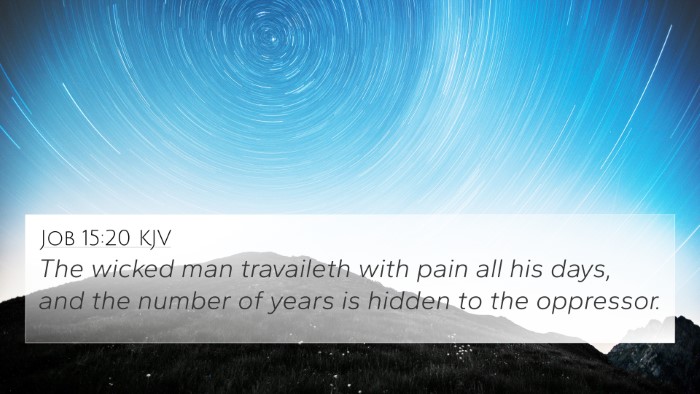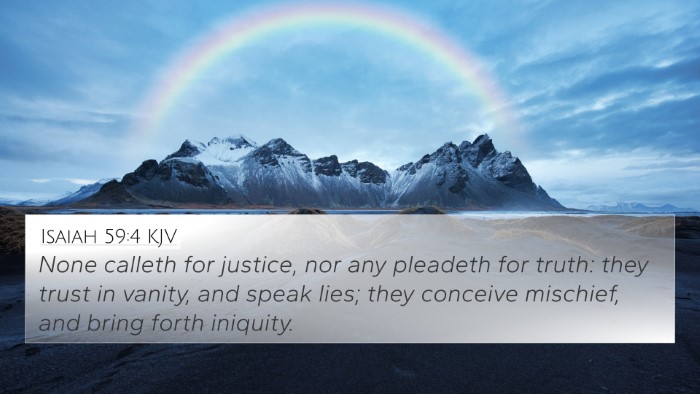Psalms 7:14 - Interpretation and Meaning
Psalms 7:14 states:
"Behold, he travails with iniquity, and hath conceived mischief, and brought forth falsehood."
This verse offers a profound reflection on the consequences of wrongful actions and the nature of deceit.
It serves as a reminder of the inherent struggles associated with wrongdoing, emphasizing that evil intentions ultimately yield falsehoods.
Summary of Insights from Public Domain Commentaries
This verse is rich in meaning and can be understood more deeply through the insights of several renowned biblical commentators. Below are summarized interpretations from Matthew Henry, Albert Barnes, and Adam Clarke.
-
Matthew Henry:
Henry explains that this verse illustrates the process of sin, where an evil thought or intention grows and manifests into actions that bring forth deceit.
He emphasizes that those who plan wickedness will inevitably face the consequences of their actions, illustrating a law of moral retribution present in the divine order.
-
Albert Barnes:
Barnes emphasizes the danger of harboring iniquity, explaining that such inner turmoil leads to outward actions that are contrary to truth.
He draws connections to the ways in which individuals can deceive both themselves and others, ultimately leading to a cycle of sin and shame.
-
Adam Clarke:
Clarke discusses the metaphor of "travailing" with iniquity, suggesting a birthing process that leads to the production of more sin and falsehood.
He likens this to the natural process of life, where each wrong intention produces greater sins, leading to a state of moral decay.
Related Cross References
Psalms 7:14 can be connected to several other scriptures that deepen our understanding of deceit, sin, and the repercussions of wrongdoing:
- James 1:15: "Then when lust hath conceived, it bringeth forth sin: and sin, when it is finished, bringeth forth death."
- Proverbs 6:16-19: Lists the things the Lord hates, including a lying tongue and a false witness.
- Galatians 6:7: "Be not deceived; God is not mocked: for whatsoever a man soweth, that shall he also reap."
- Job 4:8: "Even as I have seen, they that plow iniquity, and sow wickedness, reap the same."
- Romans 1:28-32: A passage that speaks to the consequences of turning away from God and indulging in unrighteousness.
- Psalms 36:3: "The words of his mouth are iniquity and deceit: he hath left off to be wise, and to do good."
- Ephesians 4:22: "That ye put off concerning the former conversation the old man, which is corrupt according to the deceitful lusts."
- Isaiah 59:4: "None calleth for justice, nor any pleadeth for truth: they trust in vanity, and speak lies; they conceive mischief, and bring forth iniquity."
- Proverbs 12:13: "The wicked is snared by the transgression of his lips: but the just shall come out of trouble."
- 1 Peter 2:1: "Wherefore laying aside all malice, and all guile, and hypocrisies, and envies, and all evil speakings."
Thematic Connections
The themes of deceit, consequence of sin, and moral integrity are pervasive throughout the Bible, linking many scriptures together.
Understanding Psalms 7:14 in light of these passages allows one to see the recurring messages of accountability and the inherent dangers of pursuing iniquity.
Cross-Referencing Biblical Texts
Cross-referencing biblical texts is a powerful tool for a deeper understanding of scripture.
The mentioned passages illustrate the nuances of sin and its repercussions, enabling believers to reflect on their own lives in the light of God's Word.
Engaging with these verses can enhance personal studies, sermon preparations, and teaching, fostering a robust spiritual foundation.
Conclusion
Psalms 7:14 serves as a poignant reminder of the seriousness of our inner thoughts and intentions.
The reflections drawn from prominent biblical commentators provide a comprehensive understanding of the verse, encouraging readers to accept the truth of God's justice in relation to sin and deceit.







